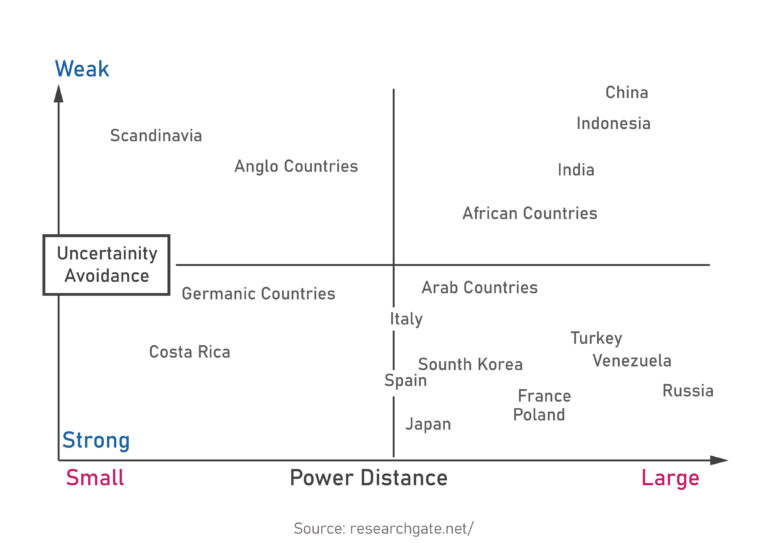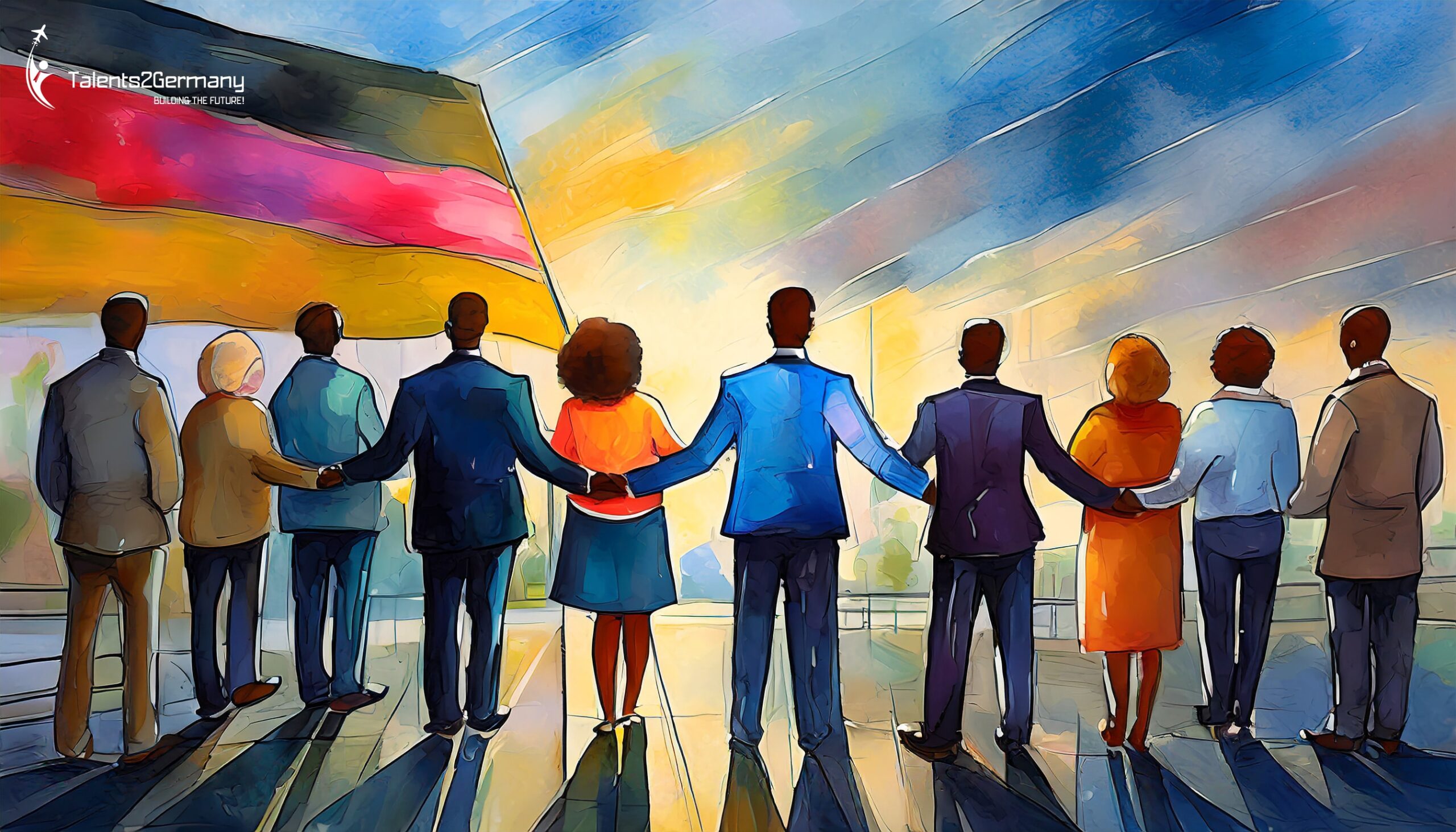Is there Racism in Germany?
Is there racism in Germany? It is one of the questions often asked by participants who are software engineers from around the world, considering migrating to Germany. You may find it surprising that as a CEO of a company that encourages talent to migrate to Germany, I am addressing this subject.

Unveiling Racism in Germany: A Personal Journey
Firstly, my personal background is connected to the issue of discrimination in Germany. While you may not see it in my skin, I was not born in Germany but in the former Soviet Union. My family’s story is about the German community in Russia, known as Volga Germans. During the beginning of World War II, my ancestors became prisoners of war, making my grandparents essentially slaves. Consequently, I experienced the brutality of the Cold War from the wrong side, not once but twice. During the first decade of my life, I was a German living in Kazakhstan, a country in the former Soviet Union. Then, when I was about nine years old, my family migrated to Germany. For the second decade of my life, I faced the pain of being from Russia in Germany and the stigma attached to it as a result of the Cold War. As I grew up and thought I had left all of that behind me, I still found myself in an unfavorable position as a woman.
Being a woman in the field of engineering turned out to be a challenging idea. To give you a glimpse of the statistics, a few years ago in Germany, only 0.4 percent of venture capital went to women, with the remaining 99.6 percent going to men. So you can understand the disparity. I have experienced various forms of unfair treatment, to put it mildly, based on being German, being from Russia, and being a woman. Regarding the topic of discrimination in Germany, there is an ongoing policy debate on what we should do as a society. Let me make it clear that I believe changes need to happen.
Fortunately, in Germany, there is a significant amount of conversation and work being done to raise awareness about gender equality, racial issues, and more. However, in this speech, I do not want to solely focus on politics because when you are in a situation of deciding to migrate to a different country, politics may seem distant. Instead, I will share a few personal experiences and perspectives that you can consider and find useful when dealing with situations related to being disadvantaged due to biological traits. So, let’s dive right into it.

Communication Styles in Germany: A Cultural Shift
So, this story comes from a dear friend of mine called Katie, who was working with speech-impaired people. She wanted to encourage those who stutter to go out and talk to others. Many people who stutter expressed their concerns about being ridiculed, laughed at, and not taken seriously by others. They felt that their stuttering created obstacles for them in their interactions. To address this, Katie came up with a game. She would take them to crowded areas and have them ask people for small favors, like directions or the time, all while stuttering. She would then observe how people reacted to them and tally the number of positive and negative responses. Surprisingly, she found that consistently, nine out of ten people were actually friendly and helpful.
One particular incident stood out during her training. There was a guy who was supposed to ask two women for directions to the train station. He ran up to them, but they got scared and ran away. He attributed their reaction to his stuttering. However, Katie noticed that there were other factors at play. The guy had just come back from vacation and hadn’t shaved yet, and he was not dressed formally. Additionally, he ran up to them and breathed heavily into their faces with his big beard. Katie pointed out that sometimes, people’s negative reactions may not be due to our perceived disadvantage but rather because we did something unusual or odd. It is easy to attribute everything to our disadvantage, but that may not always be the case.
This is not to deny the existence of disadvantages or discrimination in Germany, as I have experienced it firsthand. However, it is essential not to put everything that happens into the “it’s because” bucket. We need to be mindful of other factors that may have influenced people’s reactions. It is important to broaden our perspective and not jump to conclusions based solely on our own assumptions. Understanding this can help us navigate our experiences and interactions with others in a more balanced and open-minded way.
It’s because… Facing Uncomfortable Truths: Listening Beyond Judgment
So, this story comes from a dear friend of mine called Katie, who was working with speech-impaired people. She wanted to encourage those who stutter to go out and talk to others. Many people who stutter expressed their concerns about being ridiculed, laughed at, and not taken seriously by others. They felt that their stuttering created obstacles for them in their interactions. To address this, Katie came up with a game. She would take them to crowded areas and have them ask people for small favors, like directions or the time, all while stuttering. She would then observe how people reacted to them and tally the number of positive and negative responses. Surprisingly, she found that consistently, nine out of ten people were actually friendly and helpful.
One particular incident stood out during her training. There was a guy who was supposed to ask two women for directions to the train station. He ran up to them, but they got scared and ran away. He attributed their reaction to his stuttering. However, Katie noticed that there were other factors at play. The guy had just come back from vacation and hadn’t shaved yet, and he was not dressed formally. Additionally, he ran up to them and breathed heavily into their faces with his big beard. Katie pointed out that sometimes, people’s negative reactions may not be due to our perceived disadvantage but rather because we did something unusual or odd. It is easy to attribute everything to our disadvantage, but that may not always be the case.
This is not to deny the existence of disadvantages or discrimination, as I have experienced it firsthand. However, it is essential not to put everything that happens into the “it’s because” bucket. We need to be mindful of other factors that may have influenced people’s reactions. It is important to broaden our perspective and not jump to conclusions based solely on our own assumptions. Understanding this can help us navigate our experiences and interactions with others in a more balanced and open-minded way.

Navigating Directness: Insights from Personal Experiences
When you migrate to Germany, as you may know, Germans are known for their direct communication style. In many other cultures, people tend to beat around the bush, whereas in Germany, communication is more straightforward. This cultural preference for directness was initially studied by a gentleman named Hofstede, who became well-known for his research on this topic. German communication may come across as rude from other cultural perspectives, but it’s important to note that they speak to everyone in this manner, not just to you. So if you come from a culture where politeness is expressed differently, such as not giving criticism directly, it might take some getting used to. It’s essential to remember that this directness is not necessarily rooted in racism or personal targeting. Germans simply communicate with everyone in a similarly direct manner.
Let me share a personal story to illustrate this point. I had the opportunity to play squash in a club where only men were allowed, and I was the only beginner and woman there. Despite being a novice, no one treated me with special consideration or gentleness. They didn’t give me any favors because I was slowing them down. Initially, I felt a strong determination to prove myself and demonstrate my abilities. So, I took extra secret squash training lessons, determined to show them what I was capable of. Eventually, after six months, I won my first match against someone who had been playing for ten years. It was an incredibly satisfying experience, as I developed a deep passion for playing squash.
Later, when I moved to another city, I sought out another squash club. This club was more inclusive, with a designated section for women, and they made it a mission to support women in the sport. On the surface, it seemed like a positive environment. However, the trainer there had a different approach. He was very polite and kind, but he would patiently point out my mistakes and explain what I needed to do differently. I found myself frustrated because by the time he finished explaining, I would be cold and have to start my warm-up again. I suggested that he yell at me if I made a mistake or push me to run faster, just like he did with the male players. However, he refused, stating that it wasn’t appropriate to speak that way to a lady. This confused me because his approach didn’t bring out the best in me, and I didn’t feel the same adrenaline kick when playing squash anymore. It was as if I hadn’t even exerted myself. To my surprise, when I observed how he trained the boys, he used more direct and even sharp language, calling them names like “dormant turtle” to motivate them. I realized that the trainer was hesitant to adopt a similar approach with me due to a fear of being disrespectful or rude towards women. Despite my efforts to change his style, I didn’t see much improvement over three years, and I eventually quit playing squash altogether.
This story highlights an important point: when people communicate in a sharp or direct manner, it is not always a personal disadvantage or an act of targeting. It’s crucial to consider the context and how they speak with others in their circle. Sometimes, the communication style may not align with the typical German approach. It’s important to be mindful of these nuances and not jump to conclusions about being personally disadvantaged compared to others.

Facing Uncomfortable Truths: Listening Beyond Judgment
Sometimes, people may criticize us for a simple reason – because they are right. And they have a point. I acknowledge that it’s uncomfortable to hear, but the point they make might genuinely be correct. It’s important, again, not to dismiss it outright but to simply listen, even when the feedback is harsh and critical, and strive to grow. This doesn’t mean it happens every time, but often, it might just be the case that they are right. Someone may be a bit more reserved towards you than towards others. While it’s easy to judge that person and label them with bad intentions, consider the possibility of a different perspective.
What if that person is insecure about their English language skills, fearful or uncomfortable speaking English, concerned that you might judge them due to past experiences of being criticized for imperfect English skills? They might be cautious, fearing judgment, just as you are fearful of being judged by them. This mutual fear often leads to misjudgments and misunderstandings. If you sense resentment from others, perhaps exercising a little patience and avoiding snap judgments could be beneficial. Don’t judge the book by its cover.
Workplace Discrimination in Germany – Identity, Privilege, and Perception
Speaking of which, when working with people from Africa or Asia, I often encounter assumptions about my privilege based on the pigmentation of my skin. Would you have known about my parents being slaves? Could you have guessed my experiences until I shared my story with you? Chimamanda Ngozi Adichie discussed the danger of a single story, emphasizing how we tend to form opinions based on limited information. Just as you might think you know something about Germany, I might believe I understand your country. However, we often judge each other like books by their covers. Only by sharing our stories do we gain additional perspectives. By telling my story, you might realize that Germans have experienced challenges you weren’t aware of. Likewise, listening to your story could shift my perspective and broaden my understanding of your homeland.
Building Bridges: Stories Beyond Borders
This entire discourse on racism in Germany isn’t to suggest that we shouldn’t strive to change societies – we absolutely should, addressing issues related to skin color, gender, and various other aspects. From a personal standpoint, however, remaining a victim doesn’t contribute positively. There’s so much more we can do. By sharing your story and becoming an ambassador for your country and culture, especially when moving to Germany, you provide people with a chance to know your story firsthand, not just through media portrayals. Making an effort to listen to others’ stories reveals that Germans have diverse experiences beyond what some Hollywood movies might suggest. This mutual understanding can help build businesses, and friendships, and contribute to societal change. Together we can create an impact and change the world. One friendship at a time.




